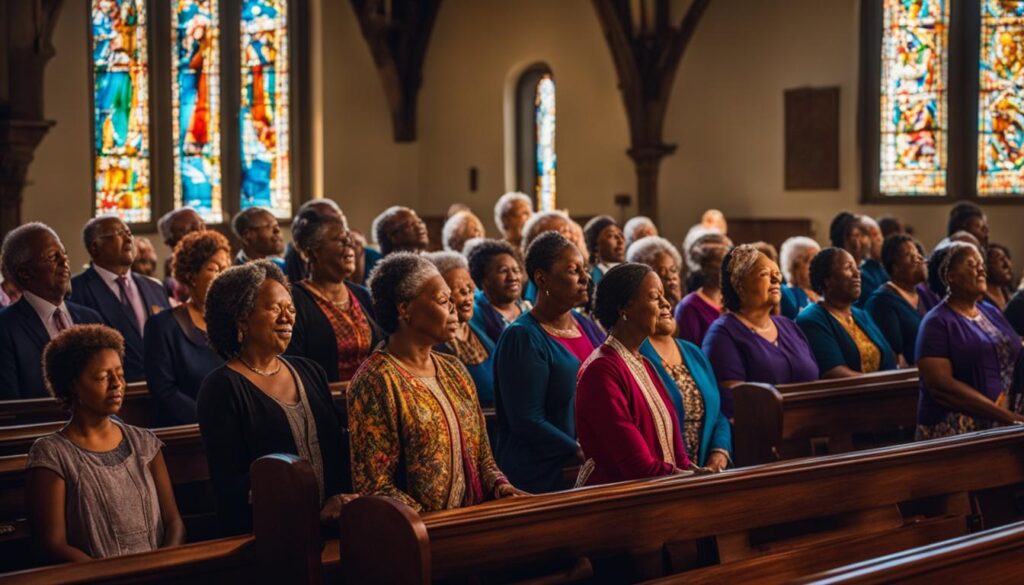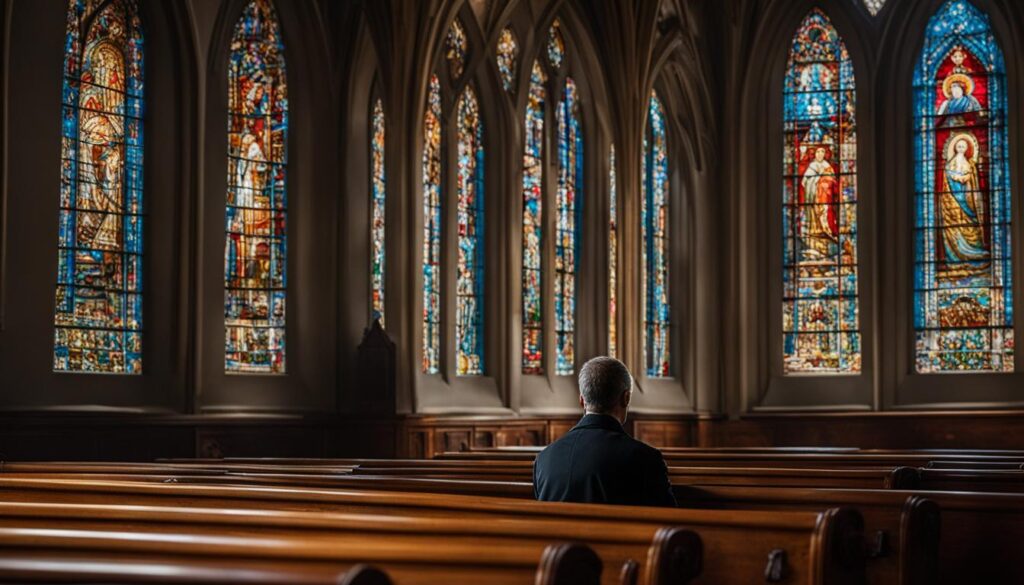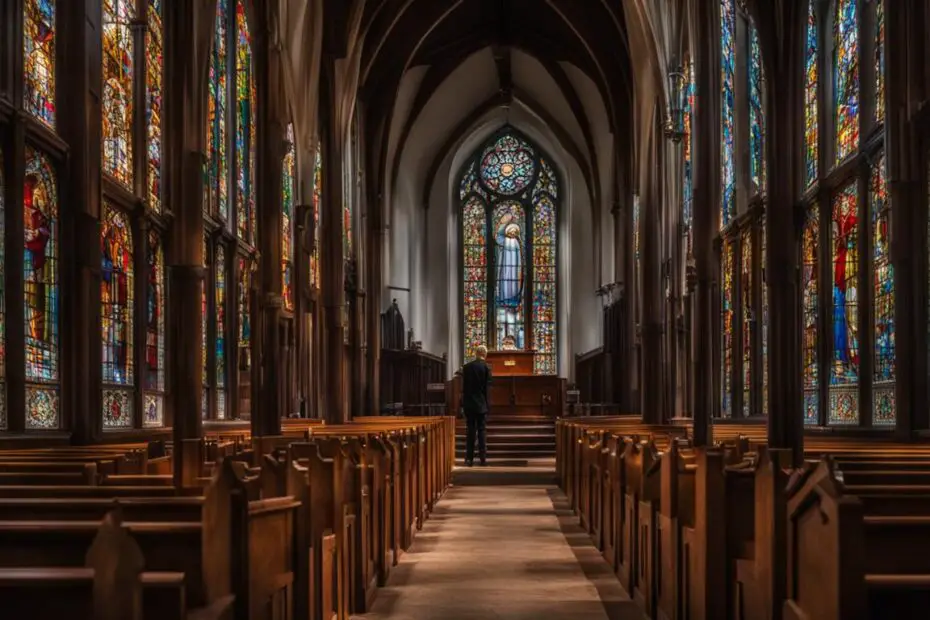Being an atheist attending a church service may seem like an unconventional choice, but it can offer a unique opportunity for introspection and personal growth. As a non-believer in a religious gathering, navigating the space and coping with atheism in a church setting can be a thought-provoking experience. It allows for a deeper understanding of the power of music, the significance of community, and the challenges of balancing personal convictions with traditional practices.
Key Takeaways:
- Attending a church service as an atheist provides an opportunity for personal reflection and growth.
- Exploring a religious gathering can deepen understanding of music, community, and tradition.
- Coping with atheism in a church setting requires navigating the challenges of personal beliefs and respecting the practices of others.
- Despite the absence of belief in a higher power, churches can serve as peaceful spaces for meditation and reflection.
- Visiting churches during travel can offer insights into local communities and shared humanity.
Spirituality Unveiled: The Role of Music in Church Services
Stepping into the serene atmosphere of the church, I found myself surrounded by soft melodies floating through the air. The low-volume music played a significant role in setting the tone for the service, igniting a sense of calm and introspection within me. Although I did not personally resonate with the music on a spiritual level, its ability to evoke deep emotions and foster personal contemplation became apparent.
The power of music in a church service extends beyond its religious significance. It serves as a catalyst for introspection, allowing individuals to delve into their own thoughts and emotions. The soft piano melodies and tranquil choir harmonies created a tranquil ambiance, inviting quiet reflection and a momentary escape from the hustle and bustle of daily life. This profound connection between music and spirituality is evident in the way it influences the atmosphere and emotional experience of worship.

The Serenity of Sacred Sounds
“Music is a higher revelation than all wisdom and philosophy,” once said renowned composer Ludwig van Beethoven. This quote encapsulates the essence of the power of music in a church service. Whether it be the stirring crescendo of an organ or the gentle melody of a hymn, the carefully curated selection of music enhances the spiritual experience for worshippers, allowing them to connect with their inner selves and the divine.
“Music is the mediator between the spiritual and the sensual life.” – Ludwig van Beethoven
Moreover, the communal singing that accompanies the music reinforces the sense of unity within the church. As voices intertwine and harmonize, a collective energy is created, transcending individual beliefs and fostering a shared spiritual experience. This amplifies the power of music, transforming it into a unifying force that binds the congregation together.
In conclusion, the journey into the church revealed the profound impact of music on the spiritual experience. While my personal beliefs may differ, I gained a deeper understanding of the role music plays in creating an atmosphere of tranquility and introspection. It showcased the universal nature of music’s ability to stir emotions and bring people together, transcending religious boundaries. In the sanctuary of the church, the power of music unveiled itself, leaving an indelible mark on my spiritual exploration.
Surrounded by Worship
As the service progressed, it was impossible to ignore the overwhelming devotion and authenticity of the congregation. The passionate voices and genuine expressions of faith created an atmosphere of fervor and energy. While I couldn’t fully relate to the emotions expressed, witnessing the communal engagement reinforced the power of shared beliefs and the strength found in genuine worship.
Throughout the service, hymns and prayers were recited with unwavering conviction. The communal engagement was palpable, with congregants singing and praying in unison. It was a testament to the deep-rooted connections forged through shared beliefs and the sense of belonging that comes from worshipping together. Authenticity radiated from every individual, reflecting a level of dedication and devotion that was truly inspiring.
One particular moment stood out during the service when a member of the congregation shared a personal testimony. Their unwavering belief and the emotional impact it had on those around them underscored the power of authenticity in fostering a strong community. It was a reminder that genuine engagement and a sincere connection to one’s beliefs can create a profound sense of unity among like-minded individuals.
The Power of Authenticity in Beliefs
The experience highlighted the importance of authenticity in beliefs. While I may not have shared the same faith as those around me, the commitment and genuine devotion of the congregation left a lasting impression. It is a testament to the power of being true to oneself and wholeheartedly embracing what one believes in.
Throughout the service, the atmosphere was filled with a deep sense of faith and conviction. The communal engagement and the sincerity with which the congregation worshipped further emphasized the significance of authenticity in beliefs. It served as a reminder that individual beliefs, even when different, can serve as a unifying force, fostering a sense of community and providing strength and support for one another.
As an outsider in a religious setting, surrounded by worship, I gained a newfound respect for the power of communal engagement and the authenticity of beliefs. It was a humbling experience that challenged my preconceptions and opened my eyes to the unifying force that faith can be. While I may not share the same beliefs, I now understand the importance and value of authenticity in one’s own convictions and the profound impact it can have on fostering a strong and connected community.

The Value of Community
One of the most profound aspects of attending a church service as an atheist was the sense of belonging and the support network that the religious community provided. Despite not sharing the same beliefs, the members of the congregation welcomed me with open arms and showed genuine care and compassion. This sense of community highlighted the importance of human connection and the power of shared experiences within a religious context.
Within the church, I witnessed people coming together to support one another through various life events and challenges. Whether it was celebrating joyous occasions like weddings and baptisms or offering comfort during times of loss and grief, the congregation formed a tight-knit support network. This network provided individuals with a sense of belonging and a place where they could find solace and understanding.
| Benefits of Community in Religious Settings | Explanation |
|---|---|
| Emotional Support | The community offers a safe space to share emotions and seek comfort during difficult times. |
| Social Connection | Being part of a community fosters friendships and social bonds, reducing feelings of isolation. |
| Sense of Purpose | Belonging to a community provides individuals with a sense of purpose and a feeling of being part of something greater. |
“Being embraced by the church community, despite our differences in beliefs, created a sense of belonging and reminded me of the importance of finding support and connection in unexpected places.”
As an atheist, experiencing this sense of community challenged my preconceived notions and encouraged me to reflect on the significance of belonging and support networks. It emphasized the universal human need for connection and the potential benefits that can arise from shared experiences within a religious community. While my beliefs may differ, I couldn’t deny the power of the community in providing individuals with a sense of belonging and a support system that extends beyond religious boundaries.

The Power of Music
Music has a profound impact on human emotions and can be a catalyst for spiritual experiences. In a church setting, the power of music becomes even more pronounced, as it is intricately woven into the fabric of worship. The combination of melodic harmonies, meaningful lyrics, and the collective voices of the congregation can evoke a range of emotions and create a sense of unity and connectedness.
“Music expresses that which cannot be put into words and that which cannot remain silent.” – Victor Hugo
When attending a church service as an atheist, the emotional response to the music was unexpected but undeniable. The melodies stirred a sense of nostalgia and familiarity, reminding me of the power of music as a universal language that transcends individual beliefs. It served as a reminder of the shared human experience and the ability of music to touch the depths of our souls.
Moreover, the music served as a bridge between individuals, connecting them in a moment of collective expression. The harmonious melodies and the rhythmic beats became a unifying force, bringing together people from different walks of life. It was a testament to the power of music to create a sense of community and foster a shared sense of purpose.
| Emotional Response | Shared Experience | |
|---|---|---|
| Music in Church | Elicits a range of emotions, even for non-believers | Creates a collective experience of shared expression |
| Music in Secular Settings | Also evokes emotions, but in a different context | Facilitates individual connection to the music |
The power of music to elicit emotional responses and create a sense of connection goes beyond the walls of a church. Whether it be in a secular setting or a religious one, the universal language of music has the ability to touch hearts and minds, fostering a shared experience that transcends individual beliefs and backgrounds.
Personal Growth and Perspective
Attending a church service as an atheist offered a unique opportunity for personal growth and a broader understanding of spirituality. While it didn’t result in a conversion or a change in beliefs, the experience allowed for introspection, reflection, and an appreciation for the power of music and communal engagement. Through this journey, I gained insights that expanded my perspective on the human experience.
In the church setting, I was able to observe the ways in which spirituality is fostered through music and communal participation. The power of music to evoke emotions and create a sense of tranquility became evident as the service progressed. Witnessing the passionate expressions of faith from the congregation reinforced the importance of community and the strength found in shared beliefs.
The experience also highlighted the importance of open-mindedness and the exploration of ideas beyond one’s own beliefs. It challenged me to think critically about my own convictions and to appreciate the diversity of human experiences. By immersing myself in a religious environment, I gained a deeper understanding of the role that spirituality plays in people’s lives and the ways in which it can bring comfort and meaning.

| Insights | Reflections |
|---|---|
| Music as a catalyst for introspection | The music played during the service created a peaceful ambiance and allowed for personal contemplation, even for someone who didn’t resonate with it on a spiritual level. |
| The power of community in fostering beliefs | Witnessing the authenticity and fervor of the congregation reinforced the value of communal engagement and the support found in shared beliefs. |
| The importance of open-mindedness | The experience encouraged me to expand my perspective and consider the diversity of human experiences and beliefs beyond my own. |
| Appreciation for the significance of spirituality | While not personally experiencing a spiritual awakening, I gained a deeper understanding of the role that spirituality plays in people’s lives and the comfort it can bring. |
Challenges of Balancing Beliefs and Traditions

Being an atheist in a religious community poses unique challenges that require careful navigation to maintain a sense of authenticity and respect for tradition. The clash between personal beliefs and communal practices can create a delicate balancing act, requiring open-mindedness and empathy from all parties involved.
One of the primary challenges is finding ways to participate in religious rituals and traditions without compromising one’s own convictions. This may involve respectfully declining certain activities while seeking alternative ways to engage in the community. It is essential for atheists and religious individuals to engage in open and honest dialogue to foster understanding and find common ground.
“Balancing beliefs and traditions requires empathy, understanding, and a willingness to learn from one another. It’s about finding harmony and respect within a diverse community.”
Respecting Tradition while Upholding Individual Convictions
Another crucial aspect is understanding and appreciating the significance of religious traditions, even from an atheist standpoint. Recognizing the cultural and historical value of these practices can lead to a greater understanding and acceptance of the community’s customs. Atheists can participate in cultural events, ceremonies, or celebrations associated with the traditions without compromising their personal beliefs. This allows for a respectful engagement while maintaining personal integrity.
Overcoming these challenges requires a delicate balance between personal boundaries and community cohesion. By fostering an open and inclusive atmosphere that embraces diversity of thought, belief, and tradition, religious communities can create spaces where atheists and believers can coexist harmoniously.
The Importance of Tradition
Despite not believing in a higher power, the atheist recognizes the importance of tradition in strengthening communities and providing continuity across generations. Ceremonies like baptism and marriage create a sense of belonging and foster communal identity. The atheist acknowledges the power of ritual to shape individual and group reality, even though it may not be seen as mystical.
In a diverse community, tradition plays a crucial role in preserving cultural heritage and promoting social cohesion. By following longstanding customs, people can establish a shared sense of identity and reinforce their bonds. Tradition serves as a bridge between the past, present, and future, allowing individuals to connect with their roots and contribute to a collective narrative.
Furthermore, tradition offers a framework for understanding and interpreting the world. It provides a sense of familiarity and stability, especially during uncertain times. Traditional practices can bring comfort and reassurance, serving as a source of guidance and wisdom. They remind us of our history and the values that have shaped our communities, instilling a sense of pride and belonging.
In summary, traditions hold significance beyond their religious or supernatural origins. They provide a foundation for community, cultural preservation, and personal growth. The atheist’s perspective on tradition recognizes its value in fostering a sense of belonging, preserving heritage, and promoting social cohesion. By appreciating the role of tradition, individuals can embrace diverse experiences and enhance their understanding of the world around them.
Churches as Peaceful Spaces
In a world filled with noise and distractions, churches often serve as peaceful havens where people can find solace and tranquility. These sacred spaces offer a serene environment, providing individuals with an opportunity to escape the bustle of everyday life and connect with their inner selves. Whether you are religious or not, a church can be a place for meditation and a source of serenity.
When you step into a church, you are welcomed by an atmosphere of quiet reverence. The soft lighting, the hushed whispers, and the scent of incense create an ambiance conducive to calmness and reflection. The architecture of churches, with their soaring ceilings and intricate details, further enhances the sense of awe and peacefulness.
Many churches also provide designated areas for prayer and meditation. These secluded spaces allow visitors to retreat into solitude, away from the distractions of the outside world. Whether you choose to sit quietly, engage in deep contemplation, or participate in a guided meditation, a church can offer the ideal setting for introspection and self-discovery.
| Benefits of Churches as Peaceful Spaces | Description |
|---|---|
| Escape from Noise | Churches provide a reprieve from the noise and chaos of the outside world, allowing individuals to find moments of peace and quiet. |
| Opportunity for Reflection | The serene environment of a church encourages introspection and reflection, offering individuals the chance to contemplate their thoughts, emotions, and beliefs. |
| Connection with Spirituality | Whether you are religious or not, the peaceful atmosphere of a church can help you connect with your spiritual side and find a sense of inner peace. |
| Emotional Healing | The tranquility of a church can provide a healing space for individuals experiencing emotional distress, offering comfort and solace. |
So, the next time you feel overwhelmed or in need of a moment of tranquility, consider visiting a church. Allow yourself to immerse in the peaceful atmosphere, find a quiet corner for meditation or reflection, and experience the serenity that these sacred spaces can offer.
Churches as Cultural Reflections
When traveling, exploring local churches can offer a unique perspective on the community and its people. It provides an opportunity to delve into the local culture and gain a deeper understanding of the traditions, values, and beliefs that shape the lives of the residents. Churches serve as cultural reflections, showcasing the identity and spirit of a locality.
By attending church services during travel, one can witness the shared humanity that transcends belief systems. Regardless of personal faith or lack thereof, the themes of community, family, and spirituality often emerge within religious settings. Engaging with the local churchgoers and observing their rituals can uncover the rich tapestry of a community’s collective history and way of life.
“Visiting churches during my travels has allowed me to glimpse into the heart of different cultures. It’s fascinating to witness the traditions, hear the prayers, and see the architectural marvels that hold meaning for the local communities. It’s a reminder that despite our differences, we are all connected as human beings.”
Exploring churches during travel also offers an opportunity for introspection and self-reflection. The serene atmosphere found within these sacred spaces allows for moments of quiet contemplation and a chance to escape the hustle and bustle of the outside world. These peaceful sanctuaries provide a respite for travelers seeking solace, inspiration, and a deeper connection with themselves.
Overall, visiting churches during travel goes beyond mere sightseeing. It allows us to understand local communities on a deeper level, appreciate their heritage, and find common ground in our shared humanity.
Conclusion
The atheist’s perspective on attending a church service was an enlightening journey of personal growth through diverse experiences. While the experience did not lead to a belief in God, it offered valuable insights into spirituality and the power of music within a religious setting.
Witnessing the communal engagement and authenticity of worship in the church reinforced the importance of community and shared beliefs. The atheist’s sense of belonging and the support received from the congregation highlighted the potential benefits of being part of a religious community.
Exploring the role of tradition in strengthening communities and creating a sense of identity encouraged a broader understanding of the significance of cultural practices, even from an atheist’s perspective. Additionally, the peaceful ambiance of churches provided a serene space for contemplation and reflection, regardless of one’s religious beliefs.
In conclusion, attending a church service as an atheist broadened perspectives and underscored the importance of embracing diverse experiences. The journey highlighted the power of music, the value of community, and the significance of tradition. It reinforced the idea that personal growth can be achieved by exploring ideas beyond one’s own beliefs and being open to the insights offered by different perspectives.
FAQ
How did attending a church service as an atheist impact the writer?
Attending a church service as an atheist provided the writer with opportunities for reflection and a deeper understanding of the power of music and communal engagement.
Did the writer experience a spiritual awakening?
No, the writer did not experience a spiritual awakening. However, the experience allowed for personal growth and broadening of perspectives.
What role does music play in a church service?
Music plays a vital role in creating a tranquil atmosphere and fostering personal contemplation within the church setting. It also strengthens bonds within the community and evokes emotions.
How did the writer feel about the sense of community within the church?
The writer recognized the genuine care, support, and compassion offered by the members of the congregation, which created a strong connection and a feeling of belonging.
Did the writer find solace in visiting churches as an atheist?
Yes, the writer found solace in the serenity of churches, using them as quiet spaces for contemplation and reflection.
Did attending a church service change the writer’s beliefs?
No, attending a church service did not result in a belief in God. However, it provided valuable insights and personal growth.
How does the writer balance personal convictions with respecting traditions in a religious community?
The writer reflects on the relationship between atheism and faith in a multi-faith environment, acknowledging the importance of tradition in strengthening communities and providing continuity across generations.
What is the significance of tradition in a religious community?
Traditions, such as baptism and marriage, create a sense of belonging and foster communal identity. They also shape individual and group reality, even if not seen as mystical by atheists.
How does visiting churches during travel provide a unique perspective?
By experiencing a local church, the writer recognizes common themes of community, family, and shared humanity that transcend belief systems.
Did attending a church service lead to personal growth for the writer?
Yes, attending a church service as an atheist provided valuable insights and prompted personal growth through diverse experiences and exploration of ideas beyond one’s own beliefs.








